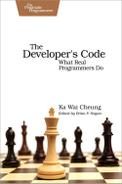| Essay 8 | The Perks Are in the Work |
In this industry, long-lasting motivation doesn’t come from the perks. Indeed, a big salary and a free lunch are nice. So is a foosball table. In the end, long-lasting motivation comes from the work we do. Every passionate programmer I’ve ever met is far more excited to tell me about an elegant solution to some technical problem they’ve spent hours agonizing over than that 10 percent raise they just received at their corporate coding gig.
Perks Aren’t Motivators in the Long Run
That’s why I’m baffled when, time after time, I watch people settle for that new yet completely uninspiring gig with the slightly larger salary and the promise of a bigger bonus, especially when it’s the young and carefree among us with only the monthly rent to pay.

Don’t stick around at the corporate gig you hate just because they’re luring you with more cash. Leave that kind of job mentality to people who are just coding for the money and waiting for the hours to pass until the next weekend.
If the difference between salary X and salary X * 1.05 is really the difference between a few more wild nights out on the town a year, go for the gig with the more interesting problems. Pick the job with the more impassioned employees. Go where you have a chance to build something beautifully, where the actual projects are at the center of everyone’s interests. What you might trade in salary (if you need to at all) you’ll more than earn back in happiness.
A telltale sign of a good company is how they approach their projects. Great projects have distinct, concrete goals. Great projects have either all the pieces in place or a plan to get them in place. Great projects are as ambitious as they are well thought out. Great projects have a defined time to deliver, rather than an undetermined amount of time and budget. These kinds of projects give work a purpose. Among the hundreds of programming projects I’ve worked on, all the great ones had these motivating qualities.
Perks Can Be Destructive
There’s even evidence that superficial perks actually make our work less motivating. Yes, the carrots dangling in front of us might actually make us less passionate to do our work.
There is a wonderful TED talk given by New York Times best-selling author Dan Pink on the surprising science of motivation.[3] He argues that traditional motivational factors in business, like a big bonus, can succeed, but they succeed only on trivial tasks, like, say, entering data from one spreadsheet into another.[4]
In contrast, tasks that involve critical analysis and creative problem-solving, like the ones that we face every day, aren’t aided by dangling a monetary prize over someone’s head. In experiments that involved higher-level thinking, there was an inverse correlation between monetary incentive and performance: the greater the monetary reward given to a particular group of subjects, the worse they ended up doing. Giving people extra rewards to accomplish a task that was already appealing at its core made the work less appealing!
For me, it doesn’t matter all that much what I’m building. It could be a one-page website, a search engine, an online Rolodex, an interactive map, or a game. It could be used by millions or thousands or eight people. It could be a six-month build or a two-hour exercise. I could be mostly writing markup, working on UI, writing server-side code, or building a database. In the end, I’m passionate about my work when I know that I have a chance to build something beautifully.
When choosing that next gig, remember what really keeps us motivated for the long haul. It isn’t the external perks; it’s the work itself.
